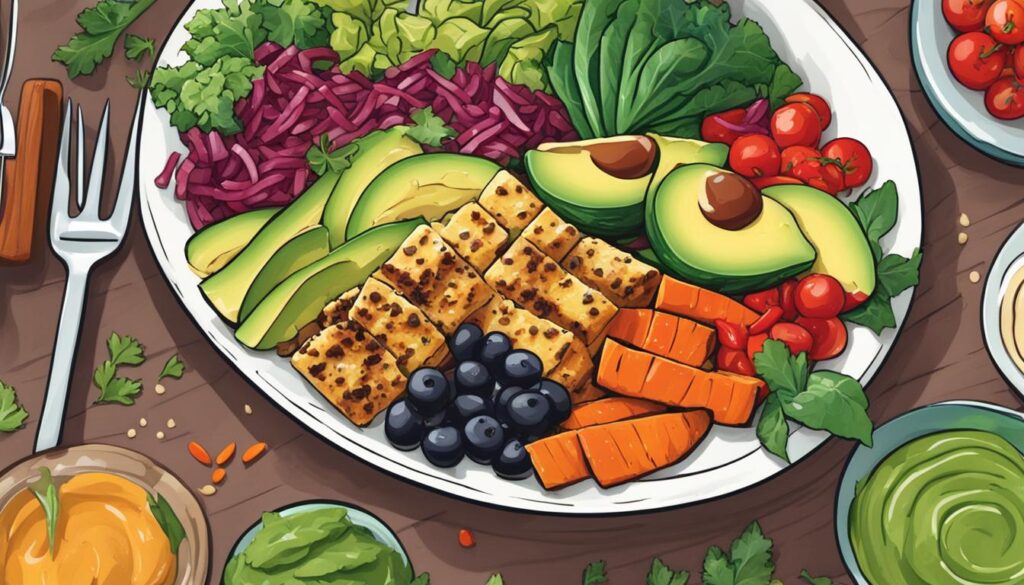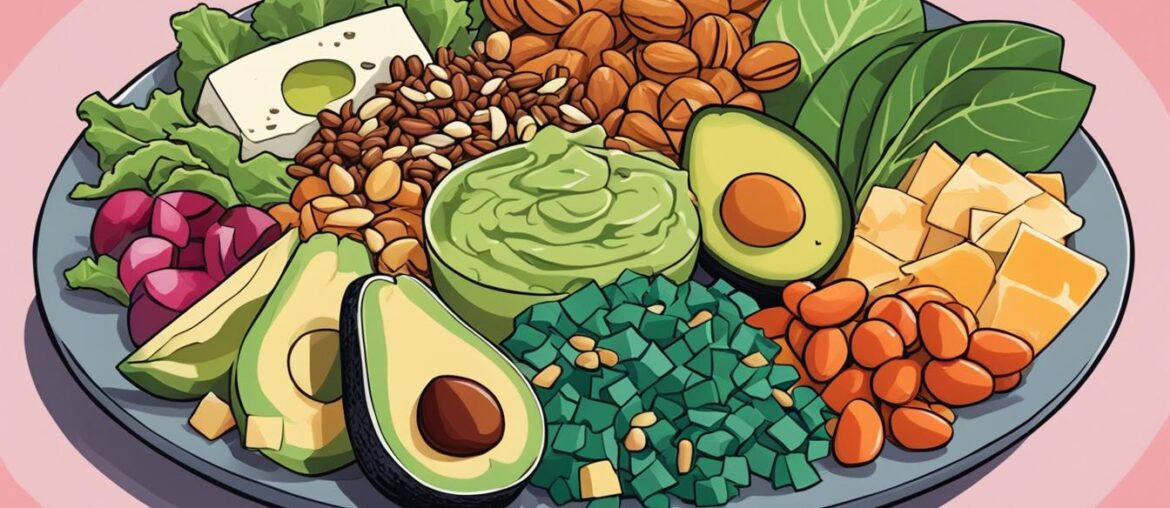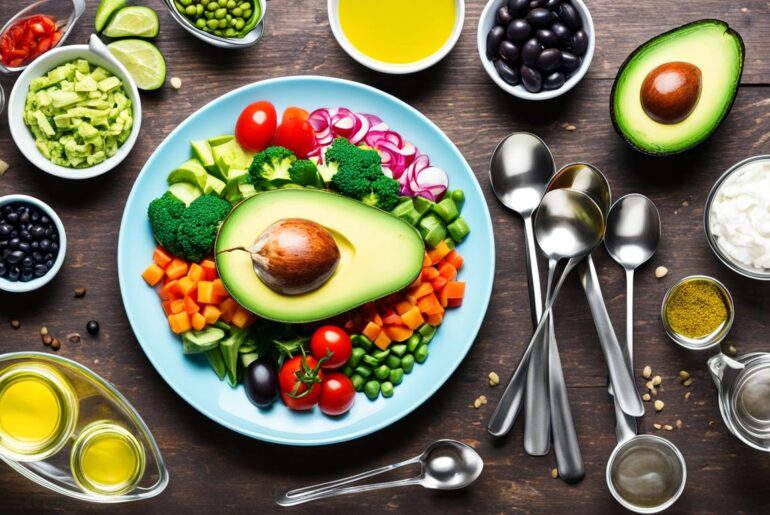Are you looking for a vegan-friendly way to lose weight and improve your overall health? Look no further! In this article, I will explore the options for a vegan ketogenic diet and provide you with a comprehensive meal plan to jumpstart your weight loss journey.
The ketogenic diet has gained popularity for its effectiveness in weight loss and numerous health benefits. However, it is traditionally focused on animal products, making it challenging for vegans to follow. But with careful planning and the right food choices, you can enjoy the benefits of a ketogenic diet while staying true to your vegan lifestyle.
A vegan ketogenic diet is a low-carb, high-fat, moderate-protein diet that excludes all animal-based foods. By consuming plant-based sources of healthy fats, such as coconut oil, avocados, seeds, and nuts, you can fuel your body and achieve a state of ketosis, where your body burns fat for fuel instead of glucose.
On a vegan ketogenic diet, you’ll need to avoid high-carb foods like grains, dairy, eggs, meat, fish, and processed foods. Instead, focus on consuming non-starchy vegetables, coconut products, oils, nuts and seeds, vegan protein sources, avocado, and berries. These foods are low in carbs and high in healthy fats, making them ideal for a vegan ketogenic lifestyle.
Following a vegan ketogenic diet can provide you with the benefits of both a vegan diet and a ketogenic diet. You can experience weight loss, better blood sugar control, reduced risk of heart disease, and other chronic conditions. It’s a sustainable and effective way to achieve your weight loss goals while enjoying the benefits of a plant-based, low-carb, high-fat, moderate-protein approach.
Ready to get started? In the next sections, I will guide you through the specifics of a vegan ketogenic diet, provide you with delicious vegan keto recipes, and share a comprehensive vegan keto meal plan. Get ready to transform your health and reach your weight loss goals with the power of a vegan ketogenic diet!
What is the Vegan Ketogenic Diet?
The vegan ketogenic diet is a low-carb, high-fat, moderate-protein diet that excludes all animal-based foods. It provides a plant-based approach to achieving ketosis, a metabolic state where the body burns fat for fuel instead of glucose. By focusing on plant-based sources of healthy fats, vegans can still benefit from the ketosis achieved in traditional ketogenic diets. The key is to carefully select foods that are high in healthy fats and low in carbohydrates.
Plant-based diets are known for their emphasis on whole foods, and the vegan ketogenic diet is no different. It encourages the consumption of foods such as coconut oil, avocados, seeds, and nuts, which are rich in healthy fats and essential nutrients. These plant-based sources of fats and proteins provide the necessary fuel for the body to enter and maintain a state of ketosis.
“The vegan ketogenic diet offers a unique approach to achieving ketosis while adhering to a plant-based lifestyle.”
One of the main goals of the vegan ketogenic diet is to limit carbohydrate intake to induce ketosis. This means avoiding high-carb foods such as grains, dairy, eggs, meat, fish, high-carb alcoholic beverages, and processed foods. Instead, the diet focuses on incorporating non-starchy vegetables, coconut products, oils, nuts and seeds, vegan protein sources, avocado, and berries. These foods are low in carbohydrates and high in healthy fats, making them ideal for a vegan ketogenic diet.
By following a vegan ketogenic diet, individuals can reap the benefits of both plant-based diets and ketogenic diets. They can enjoy the health benefits associated with a vegan diet, such as reduced risk of heart disease and improved weight management, while also harnessing the power of ketosis for increased fat burning and improved overall health.
| Benefits of the Vegan Ketogenic Diet | Description |
|---|---|
| Weight Loss | The vegan ketogenic diet promotes weight loss by encouraging the body to burn fat for fuel. |
| Improved Heart Health | By reducing carbohydrate intake, the diet can help lower triglyceride levels and improve heart health markers. |
| Steady Blood Sugar Levels | The low-carb nature of the diet can help stabilize blood sugar levels and improve insulin sensitivity. |
| Increased Energy | Many individuals report increased energy levels when following a vegan ketogenic diet. |
The vegan ketogenic diet offers a unique approach to achieving ketosis while adhering to a plant-based lifestyle. By focusing on plant-based sources of healthy fats, individuals can reach and maintain ketosis, leading to numerous health benefits such as weight loss, improved heart health, and steady blood sugar levels. With careful planning and the right food choices, the vegan ketogenic diet can be a sustainable and effective way to improve overall health and achieve weight loss goals.
Benefits of a Vegan Ketogenic Diet
Both the vegan diet and the ketogenic diet offer numerous health benefits. Research has shown that following a vegan diet can reduce the risk of chronic health conditions such as heart disease and type 2 diabetes. Additionally, individuals on a vegan diet tend to have more success with weight loss and maintaining a healthy weight compared to non-vegans.
The ketogenic diet, on the other hand, has been proven to be effective in achieving weight loss, controlling blood sugar levels, and reducing risk factors for heart disease. By combining the principles of both the vegan and ketogenic diets, individuals can potentially optimize their health benefits even further.
Following a vegan ketogenic diet allows individuals to enjoy the benefits of both the vegan and ketogenic diets, including reduced risk of chronic diseases, successful weight loss, and improved overall health.
Research has consistently shown that a vegan diet can lower the risk of developing heart disease. A study published in the American Journal of Clinical Nutrition found that vegans have up to a 75% lower risk of developing high blood pressure, which is a major risk factor for heart disease.
Benefits of a Vegan Diet:
- Reduced risk of heart disease
- Lower blood pressure
- Improved blood sugar control
- Lower cholesterol levels
- Reduced risk of certain types of cancer
The ketogenic diet, known for its effectiveness in weight loss, has also been shown to have positive effects on heart health. A study published in the Journal of the American College of Cardiology found that a low-carbohydrate ketogenic diet can help reduce risk factors for heart disease, including improving blood pressure and cholesterol levels.
Benefits of a Ketogenic Diet:
- Effective weight loss
- Better blood sugar control
- Reduced risk of heart disease
- Improved cholesterol levels
- Increased mental clarity and focus
By following a vegan ketogenic diet, individuals can harness the health benefits of both diets, maximizing the potential for weight loss, improved heart health, blood sugar control, and overall well-being.
| Benefits | Vegan Diet | Ketogenic Diet | Vegan Ketogenic Diet |
|---|---|---|---|
| Reduced risk of heart disease | ✓ | ✓ | ✓ |
| Weight loss | ✓ | ✓ | ✓ |
| Blood sugar control | ✓ | ✓ | ✓ |
| Improved cholesterol levels | ✓ | ✓ | ✓ |
| Lower risk of chronic diseases | ✓ | ✓ | ✓ |
By adopting a vegan ketogenic diet, individuals can enjoy the combined benefits of both diets and improve their overall health and well-being.

Foods to Eat and Avoid on a Vegan Ketogenic Diet
When following a vegan ketogenic diet, it is important to be mindful of the foods you consume. To successfully achieve ketosis and maintain a healthy nutritional balance, it is crucial to avoid certain high-carb foods and focus on consuming low-carb, plant-based alternatives that are rich in healthy fats.
Foods to Avoid
- Grains: Stay away from grains such as wheat, rice, oats, and barley, as they are high in carbohydrates.
- Dairy: Avoid all dairy products, including milk, cheese, butter, and yogurt, as they are not suitable for a vegan diet.
- Eggs: Since eggs are an animal product, they are not part of a vegan ketogenic diet.
- Meat and Fish: Eliminate all meat and fish from your diet as they are high in both protein and carbs.
- High-carb Foods: Steer clear of high-carb foods like bread, pasta, potatoes, and other starchy vegetables.
- Fruits: While fruits are generally healthy, they contain natural sugars that can hinder ketosis. Avoid high-sugar fruits such as bananas, grapes, and mangoes.
- Alcohol: Alcoholic beverages, especially those high in sugar and carbs, can disrupt ketosis. It’s best to avoid alcohol altogether.
- Processed Foods: Processed foods, including packaged snacks and desserts, often contain hidden sugars and unhealthy additives. Opt for whole, unprocessed foods instead.
Vegan Keto Foods to Enjoy
“With careful planning, a vegan ketogenic diet can be both nutritious and delicious.”
Fortunately, there are plenty of vegan-friendly foods that you can enjoy while following a ketogenic diet. These foods are low in carbs and high in healthy fats, making them perfect for maintaining ketosis:
- Non-starchy Vegetables: Load up on leafy greens, cruciferous vegetables, and other low-carb veggies to get your necessary nutrients.
- Coconut Products: Coconut oil, coconut milk, and shredded coconut are excellent sources of healthy fats.
- Oils: Use oils such as olive oil, avocado oil, and coconut oil for cooking and dressing your meals.
- Nuts and Seeds: Almonds, walnuts, chia seeds, and flaxseeds are all great sources of healthy fats and essential nutrients.
- Vegan Protein Sources: Incorporate plant-based proteins like tofu, tempeh, and seitan into your meals to meet your protein needs.
- Avocado: This versatile fruit is rich in healthy fats and can be added to salads, smoothies, and even used as a substitute for butter or mayo.
- Berries: Enjoy low-sugar berries like strawberries, blueberries, and raspberries for a sweet treat that won’t disrupt ketosis.
- Condiments: Choose condiments that are low in carbs and free from added sugars, such as mustard, vinegar, and sugar-free hot sauce.
By focusing on these vegan keto foods, you can create delicious and satisfying meals that support your weight loss goals and overall health.
Conclusion
The vegan ketogenic diet is a powerful tool for weight loss and improving overall health. By combining the principles of a plant-based diet with the low-carb, high-fat approach of a ketogenic diet, individuals can reap the benefits of both. This hybrid diet allows you to achieve ketosis, where your body burns fat for fuel, while also enjoying the benefits of a plant-based lifestyle.
One of the key advantages of the vegan ketogenic diet is its effectiveness in promoting weight loss. By reducing carbohydrate intake and increasing healthy fats, individuals can experience steady and sustainable weight loss. This is particularly beneficial for those who struggle with stubborn body fat or have difficulty losing weight through traditional methods.
Additionally, the vegan ketogenic diet offers various health benefits. It has been shown to improve blood sugar control, reduce the risk of heart disease and type 2 diabetes, and enhance overall metabolic health. By prioritizing plant-based sources of fats and proteins, individuals can also benefit from the vast array of vitamins, minerals, and antioxidants found in plant foods.
Embarking on a vegan ketogenic diet requires careful planning and attention to food choices. It’s important to focus on consuming non-starchy vegetables, coconut products, oils, nuts and seeds, vegan protein sources, avocado, and berries. By doing so, you can ensure you’re getting the necessary nutrients while achieving and maintaining ketosis.
In conclusion, the vegan ketogenic diet is a viable option for those seeking weight loss and improved health. By following this low-carb, high-fat, moderate-protein approach and incorporating plant-based foods, you can achieve your weight loss goals while enjoying the benefits of a plant-based diet. Remember, always consult with a healthcare professional or registered dietitian before making any significant changes to your diet.
FAQ
What is a vegan ketogenic diet?
A vegan ketogenic diet is a low-carb, high-fat, moderate-protein diet that excludes all animal-based foods. It focuses on consuming plant-based sources of healthy fats, such as coconut oil, avocados, seeds, and nuts, to reach a state of ketosis.
What are the benefits of a vegan ketogenic diet?
The vegan ketogenic diet combines the benefits of a vegan diet and a ketogenic diet. It can potentially lead to weight loss, blood sugar control, and reduced risk of heart disease and other chronic conditions.
What foods should I eat and avoid on a vegan ketogenic diet?
On a vegan ketogenic diet, you should avoid high-carb foods such as grains, dairy, eggs, meat, fish, high-carb alcoholic beverages, and processed foods. Instead, focus on consuming non-starchy vegetables, coconut products, oils, nuts and seeds, vegan protein sources, avocado, and berries.
Can a vegan ketogenic diet help with weight loss?
Yes, a vegan ketogenic diet can be effective for weight loss. By reducing carb intake and increasing healthy fats, the body enters a state of ketosis, where it burns fat for fuel. This can lead to weight loss and improved body composition.
Is the vegan ketogenic diet suitable for everyone?
The vegan ketogenic diet may not be suitable for everyone, especially those with certain medical conditions or dietary restrictions. It is important to consult with a healthcare professional or registered dietitian before starting any new diet.




